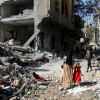Bangladesh should intervene fast in the Gaza genocide case

The renewed official condemnation by the Government of Bangladesh on April 7, 2025, of the "mass killing and gross violations of human rights in the Gaza Strip," has brought to light one of its dormant promises regarding international justice. It relates to Bangladesh's pledge to intervene in the Gaza genocide case between South Africa and Israel before the International Court of Justice (ICJ). It is worth mentioning that the Ministry of Foreign Affairs of Bangladesh expressed its intention to intervene in the case by issuing a press statement on January 14, 2024, just 16 days after South Africa filed the case against Israel under the Genocide Convention. Though 13 countries have already approached the ICJ with their intervention applications, Bangladesh has yet to make any concrete measures reflecting the prior commitment.
It is worth mentioning that Bangladesh has a constitutional obligation to support the Palestinian cause as per Article 25 of our constitution. As a long-time supporter of the Palestinian cause, Bangladesh has endorsed it at international forums, both individually and collectively with the Organization of Islamic Cooperation (OIC). Earlier, on November 17, 2023, Bangladesh, along with South Africa, Bolivia, and Djibouti, referred the Palestine situation to the International Criminal Court (ICC). As regards the ICJ, Bangladesh made written and/or oral submissions in the four advisory opinions related to Palestine. Hence, it is incomprehensible why Bangladesh is still silent on its commitment to intervene.
Bangladesh has never intervened in an ICJ contentious case before, even though it had the opportunity to do so in the Rohingya genocide case. This calls for an assessment of its potential intervention within the ICJ's legal framework and relevant practices.
Under the ICJ statute, a state may intervene in two ways. First, under Article 62 of the ICJ statute, a state may intervene if it has an interest of a legal nature that may be affected by the court's decision. Second, under Article 63, a state may intervene when the interpretation of a multilateral treaty is in question, and it is a party to the treaty. From the language of the press statement of Ministry of Foreign Affairs, it can be safely presumed that Bangladesh intends to intervene under Article 63. The nature of the Genocide Convention, which is a multilateral treaty, also confirms the nature of Bangladesh's potential intervention. Most of the interventions in the Genocide Convention-related cases are under Article 63.
At this stage, Bangladesh's potential intervention is complicated by its reservation on Article IX of the Genocide Convention, which states "Disputes between the Contracting Parties relating to the interpretation, application or fulfilment of the present Convention, including those relating to the responsibility of a State for genocide or for any of the other acts enumerated in article III, shall be submitted to the International Court of Justice at the request of any of the parties to the dispute." The US faced a similar complication when it sought to intervene in the Ukrainian genocide allegation case. Russia objected to the US intervention, and the ICJ, in its Order of June 5, 2023, declared it inadmissible due to the US reservation to Article IX.
It is important to note that the US intervention was specifically focused on Article IX and was made at the preliminary objections stage. The court's position was based on two key considerations. First, the US reservation to Article IX meant it had excluded the provision from the Convention as it applied to the US. Therefore, the court ruled that "the United States may not intervene in relation to the construction of Article IX of the Convention while it is not bound by that provision" (order of June 5, 2023). Second, at the preliminary objections stage, the ICJ primarily deals with jurisdictional and admissibility issues, so it was logical for the court to limit its ruling to Article IX while leaving open the possibility of a future US intervention at the merits stage (order of June 5, 2023).
The ICJ, in its order of April 5, 2024, set October 28, 2024, as the deadline for South Africa's memorial submission, i.e., a brief outlining their case and legal reasoning in the dispute. The deadline was met. Meanwhile, July 28, 2025, is the deadline for Israel's counter-memorial submission. Additionally, Israel had until January 28, 2025, to file its preliminary objections. While there is no publicly available information about Israel's preliminary objections, it has likely done so.
If Israel has indeed raised such objections, Bangladesh cannot intervene at this stage due to its reservation to Article IX. In that case, the fate of Bangladesh's intervention will depend on the judgment on preliminary objections. However, the ICJ has already found that it has prima facie jurisdiction over this case in its Provisional Measures Orders. Given its similarity to the Rohingya genocide case, it is unlikely that the court will rule otherwise in the preliminary objections judgment. If the case proceeds beyond this stage, Bangladesh will get at least two additional years to submit its intervention. However, given the political implications of the intervention on the case and the dispute, Bangladesh should consider intervening at its earliest opportunity.
At the same time, Bangladesh must carefully determine the scope of its intervention. South Africa's claims in the case are expected to focus on Articles I-VI of the Genocide Convention. Once the memorial and other case documents become available, Bangladesh will gain a clearer understanding of potential areas for intervention. Given that many states are expected to intervene, Bangladesh should strategically determine its scope to maximise the impact of its intervention on the proceedings.
Bangladesh should submit its declaration of intervention at the earliest opportunity, regardless of the preliminary objections issue. Typically, the ICJ scrutinises a state's declaration of intervention, but recent cases indicate that Article 63 interventions are generally permitted. Since 13 states have already submitted their declarations of intervention and/or applications for permission to intervene, Bangladesh should not wait for the preliminary objection's outcome. The interim government of Bangladesh should reaffirm the relevance of the previous government's declaration and set a timeline for submitting its intervention request.
Quazi Omar Foysal is lecturer at American International University-Bangladesh (AIUB) and advocate at the Supreme Court of Bangladesh. He can be reached at [email protected].
Views expressed in this article are the author's own.
Follow The Daily Star Opinion on Facebook for the latest opinions, commentaries and analyses by experts and professionals. To contribute your article or letter to The Daily Star Opinion, see our guidelines for submission.

 For all latest news, follow The Daily Star's Google News channel.
For all latest news, follow The Daily Star's Google News channel. 





Comments